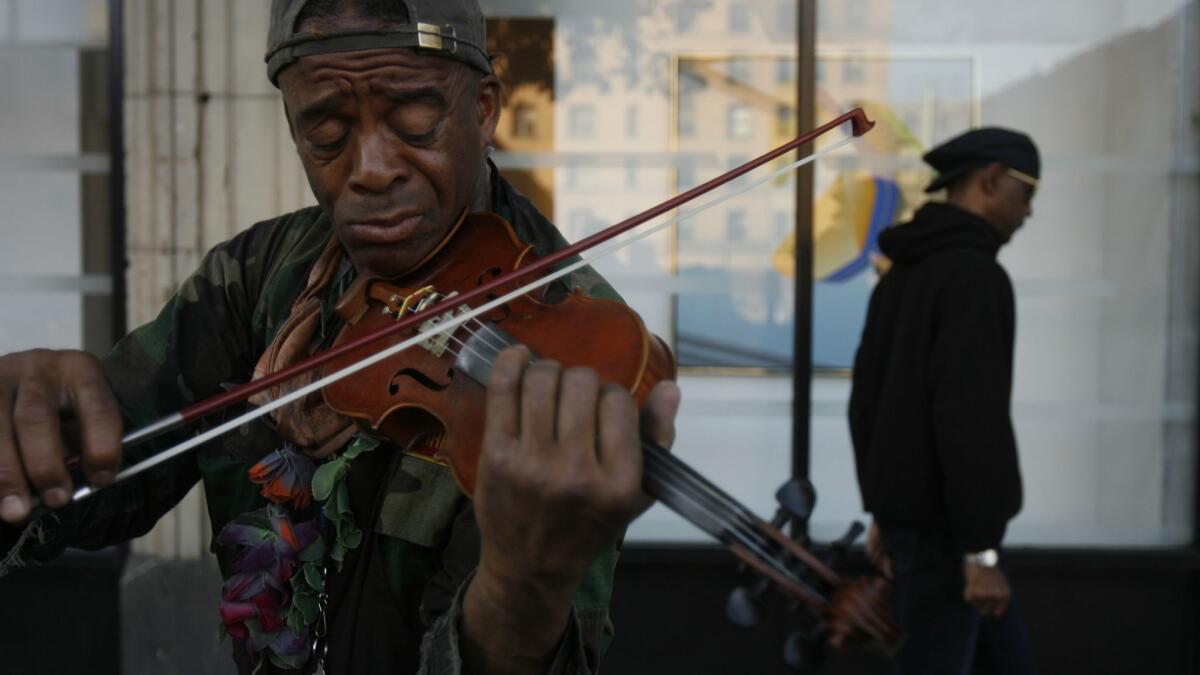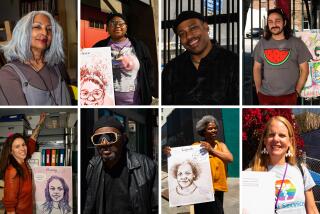Column: One mental health advocate thrives, another fights for his life
If not for Nathaniel Ayers, I probably never would have met Jim Preis, a lawyer, and Vijay Gupta, a violinist.
That’s the kind of journey it has been with Ayers, a homeless skid-row musician I met in 2005. He’s taken me places I’d never been to, like the White House, where he performed at the invitation of the Obama administration. And he’s made connections for me with mental health advocates.
People such as Preis, who will be honored this month by the Mental Health Advocacy Services nonprofit he ran for nearly 40 years. And L.A. Philharmonic musician Gupta, the recipient Thursday of a MacArthur Foundation genius grant honoring his nonprofit Street Symphony, which takes classical music to prisons, mental health clinics and shelters. Gupta was chosen for “bringing beauty, respite and purpose to those all too often ignored by society.”
A few days ago, when I visited Ayers at the mental health rehabilitation center where he lives, he told me he was on an Andre Watts jag and couldn’t get enough of the classical pianist. I got out my phone, as I often do during our visits, and asked Ayers what he wanted to hear. The Liszt Sonata in B Minor, he said. So we watched Watts hammer that for a while before Ayers asked if I could find a video of Watts playing the Rachmaninoff Piano Concerto No. 2.
As we shared that, Ayers — who played briefly with Yo-Yo Ma in the Juilliard School student orchestra — told me he had also once played double bass on a New York stage with Watts.
The man never ceases to amaze.

Thanks to Ayers’ willingness to let me write about him, Preis and his nonprofit honored us at their 2008 gala.
Ten years later, the gala is scheduled for later this month, and as I said, this time the honoree is Preis himself. He is retiring after four decades of defending the rights of those with disabilities and mental illness. But several days ago, I learned from Bob Sipchen — my former editor and a close friend of Preis’ — that Jim is fighting the spread of cancer and is worried he might not be able to attend the event.
Sipchen and Alex Raksin won the Pulitzer Prize in 2002 for a series of Times editorials on solutions to people living on the streets with mental illness and addiction. Back then, Sipchen learned that Preis was a national authority with firm convictions but a civil nature, even if he disagreed with you.
“Our editorials wound up advocating for, among other things, expanding the way that people with mental illness could be involuntarily committed. Jim remains passionate in his belief that on this point we were wrong,” Sipchen said.
Sipchen admired the way in which Preis and his team fought for equal protection of everyone, including those “too ill or poor to take the fight to the courts or legislatures themselves.” In recent weeks, Sipchen was inspired by “the courage and dignity” with which Preis faced his own disabilities, such as “getting in and out of a car on cancer-withered legs. … I suspect his attitude stems from him always seeing the dignity in the people he works to help.”
Elyn Saks, the USC law professor who wrote about her own struggles with schizophrenia in the book “The Center Cannot Hold,” said Preis — her faculty mate at USC — has fought ferociously to make sure the wishes of patients are heard.
“He really wanted to find alternatives to hospitalization so people would be neither institutionalized nor living on the streets,” Saks said.
I went to the hospital Friday morning to visit Preis, but he was too sedated for us to have a conversation. His wife, Debbie, daughter Annie and son John were at his side, hoping doctors could stabilize him so he could begin immunotherapy treatment.
“He made very clear the best thing you could do with your life’s work was public service,” said Annie, a U.S. Navy lawyer. John is on that same track after serving as a nuclear engineer in the Navy.
In the hospital waiting room, John worked on a Facebook tribute to his father, saying the only thing his dad was never good at was raising enough money for the nonprofit to meet a growing demand for help.
“I only hope I can tell him before he goes that his life’s work is on sturdy footing,” John wrote, calling attention to the fundraising tribute to his father later this month.
I’m humbled by people like Preis, and by Gupta. I’d left him a message, congratulating him on the MacArthur award, and he called back as I was leaving the hospital Friday.
“I am elated,” he said during intermission of a Disney Hall concert in which he was performing.
I met Gupta in 2007 in the office of Adam Crane, who was then communications director for the L.A. Phil. Gupta was only 19, and said he’d had trouble deciding between music and a career in neuroscience, with a focus on brain disorders.
I introduced him to Ayers, they clicked, and Gupta was happy to offer violin pointers. Inspired by Ayers’ passion for music, Gupta and Crane teamed up to start Street Symphony, operating on the principle that great art shouldn’t be available only to a privileged minority, even as thousands of less fortunate people sprawl on city streets below Disney Hall.
Since 2011, said Gupta, there have been roughly 500 concerts involving about 100 musicians, including everyone from L.A. Phil performers to Colburn School students and skid-row residents.
“I haven’t made plans yet” as to what to do with the $625,000 grant, Gupta said. “But I feel absolutely that the work of Street Symphony is just beginning.”
His immediate goals are to have more concerts in more locations, including performances of Messiah in women’s prisons, and to hire more skid-row residents to the nonprofit staff.
Gupta threw a nod to Ayers, saying this might never have happened without his inspiration. When I called Ayers to tell him that on Friday, he was thrilled for Gupta, and wanted to know when the violinist could visit the mental hospital and give him another lesson.
Hang in there, Mr. Ayers, it’ll be soon, I’m sure.
Keep sawing away, Vijay Gupta.
And thank you, Jim Preis. The impact of your tireless devotion to a noble cause is incalculable.
(To find out more about Street Symphony and see a list of concert dates, go to streetsymphony.org. To find out more about the work of Mental Health Advocacy Services and the fundraising tribute to Jim Preis, go to mhas-la.org.)
Get more of Steve Lopez’s work and follow him on Twitter @LATstevelopez
More to Read
Sign up for Essential California
The most important California stories and recommendations in your inbox every morning.
You may occasionally receive promotional content from the Los Angeles Times.











